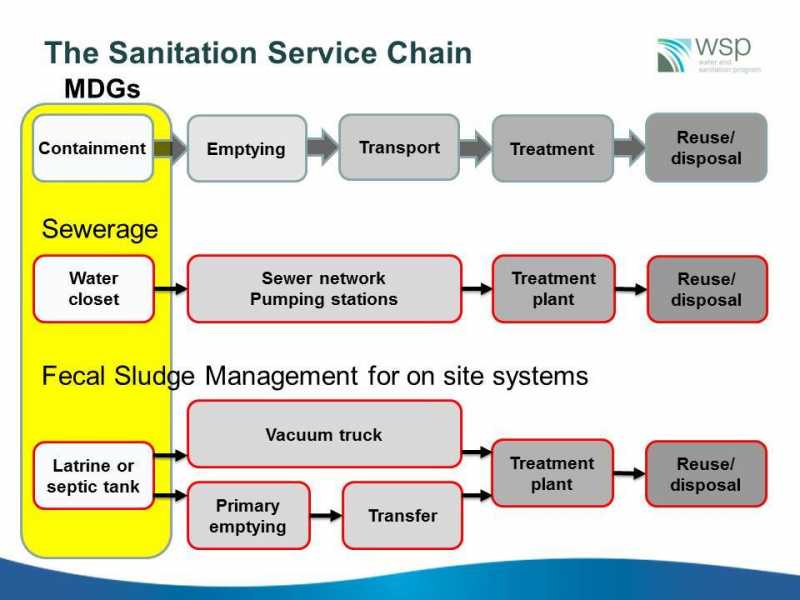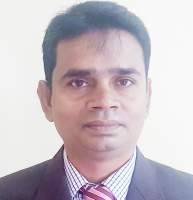- Forum
- categories
- Sanitation systems
- Faecal sludge management (FSM)
- Efficiency and management of faecal sludge in Bangladesh - and the biggest leak in the service delivery chain (a study in 12 cities)
Efficiency and management of faecal sludge in Bangladesh - and the biggest leak in the service delivery chain (a study in 12 cities)
9260 views
- phawkins
-
Less
- Posts: 4
- Karma: 1
- Likes received: 7
Re: The Biggest Leak in the Delivery Chain: Why We Need to Focus on Fecal Sludge Management
Dear all,
My name is Peter Hawkins and this is my first post on this forum. I am the team leader for the Water and Sanitation Program (WSP, www.wsp.org) in Mozambique. I have been there since 2007.
We are currently also working a lot on fecal sludge management issues. Like the people who have written above in this thread, I also think it is very important to a) look at the whole chain and b) look at sustainable service models. It is not enough to only think of toilets and technologies! There is so much more to it...
We have put our findings in this publication which came out recently:
susana.org/lang-en/library/library?view=...eitem&type=2&id=1857
Hawkins, P., Blackett, I., and Heymans, C. (2013). Targeting the Urban Poor and Improving Services in Small Towns: Poor-Inclusive Urban Sanitation: An Overview. World Bank Water and Sanitation Program (WSP), Washington, USA.
I also gave a presentation about this framework or way of integrative thinking at the recent IWA conference in Nairobi:
www.susana.org/docs_ccbk/susana_download...ation-for-iwa-v2.pdf)
We have called this presentation “The Biggest Leak in the Delivery Chain: Why We Need to Focus on Fecal Sludge Management”. Subsequently, we moved on to looking in more detail at how fecal sludge management fits into the overall framework of urban sanitation. An initial look at 12 cities across Latina America, Africa, South Asia and East Asia shows just how leaky the chain is, with little more than a quarter of fecal sludge being effectively managed:
It is also worth noting that even sewerage systems fail to deal adequately with all the material collected, with well over half escaping due to faulty pumping stations, leaking sewers and inadequate treatment ( or no treatment at all).
WSP is now undertaking detailed studies in four cities (Santa Cruz, Bolivia; Freetown, Sierra Leone; Dhaka, Bangladesh; Balikpapan, Indonesia) and aims to publish diagnostic tools and guidelines for fecal sludge management early in 2015. We’re also working with WSUP (Water and Sanitation for the Urban Poor, www.wsup.com) to develop fecal sludge management services for low-income communities in Maputo, Mozambique
I hope you find the links useful, and I’ll be very happy to discuss any issues around fecal sludge management. For me, the most challenging issue in the FSM sphere is still simply getting municipal authorities and sanitation utilities to take the management of fecal sludge from latrines and septic tanks seriously, and to institute systematic emptying, transport, treatment and disposal services, affordable to the vast majority of poor urban dwellers who will continue to rely on on-site sanitation facilities for the foreseeable future.
Regards,
Peter
WSP - Worldbank, Mozambique
My name is Peter Hawkins and this is my first post on this forum. I am the team leader for the Water and Sanitation Program (WSP, www.wsp.org) in Mozambique. I have been there since 2007.
We are currently also working a lot on fecal sludge management issues. Like the people who have written above in this thread, I also think it is very important to a) look at the whole chain and b) look at sustainable service models. It is not enough to only think of toilets and technologies! There is so much more to it...
We have put our findings in this publication which came out recently:
susana.org/lang-en/library/library?view=...eitem&type=2&id=1857
Hawkins, P., Blackett, I., and Heymans, C. (2013). Targeting the Urban Poor and Improving Services in Small Towns: Poor-Inclusive Urban Sanitation: An Overview. World Bank Water and Sanitation Program (WSP), Washington, USA.
I also gave a presentation about this framework or way of integrative thinking at the recent IWA conference in Nairobi:
www.susana.org/docs_ccbk/susana_download...ation-for-iwa-v2.pdf)
We have called this presentation “The Biggest Leak in the Delivery Chain: Why We Need to Focus on Fecal Sludge Management”. Subsequently, we moved on to looking in more detail at how fecal sludge management fits into the overall framework of urban sanitation. An initial look at 12 cities across Latina America, Africa, South Asia and East Asia shows just how leaky the chain is, with little more than a quarter of fecal sludge being effectively managed:
It is also worth noting that even sewerage systems fail to deal adequately with all the material collected, with well over half escaping due to faulty pumping stations, leaking sewers and inadequate treatment ( or no treatment at all).
WSP is now undertaking detailed studies in four cities (Santa Cruz, Bolivia; Freetown, Sierra Leone; Dhaka, Bangladesh; Balikpapan, Indonesia) and aims to publish diagnostic tools and guidelines for fecal sludge management early in 2015. We’re also working with WSUP (Water and Sanitation for the Urban Poor, www.wsup.com) to develop fecal sludge management services for low-income communities in Maputo, Mozambique
I hope you find the links useful, and I’ll be very happy to discuss any issues around fecal sludge management. For me, the most challenging issue in the FSM sphere is still simply getting municipal authorities and sanitation utilities to take the management of fecal sludge from latrines and septic tanks seriously, and to institute systematic emptying, transport, treatment and disposal services, affordable to the vast majority of poor urban dwellers who will continue to rely on on-site sanitation facilities for the foreseeable future.
Regards,
Peter
WSP - Worldbank, Mozambique
Attachments:
-
 Urbansanit...A-v2.jpg
(Filesize: 43KB)
Urbansanit...A-v2.jpg
(Filesize: 43KB)
-
Folie1_2014-01-22.JPG (Filesize: 34KB)
The following user(s) like this post: Marijn Zandee, cecile, Florian, gerhard_dario, bipin, RadfordJT
Please Log in to join the conversation.
You need to login to reply- former member
-
Less
- Posts: 101
- Likes received: 3
Re: Efficiency and management of Vacutug
Wateraid Bangladesh has gained good results on treatment of Fecael sludge in Bangladesh, and I believe they are also part of your project team in Khulna, so I guess they could be the best source of information. As I understand, your main problem at this moment is having suitable land to build the treatment plant, which municipality needs to provide.
++++++++
Note by moderators: This post was made by a former user with the login name sahrari who is no longer a member of this discussion forum.
++++++++
Note by moderators: This post was made by a former user with the login name sahrari who is no longer a member of this discussion forum.
Please Log in to join the conversation.
You need to login to reply- franckconcern
-
 Less
Less- Posts: 17
- Karma: 1
- Likes received: 14
I would say then, you have no other choice than planning some advocacy work at the local authority level. A study that clearly stresses out the urgent need for setting up a service for treating the feacal sludge could be a first step.
If you find another option, please let us know.
Cordialement
franck FLachenberg / Concern Worldwide
If you find another option, please let us know.
Cordialement
franck FLachenberg / Concern Worldwide
Franck Flachenberg| Environmental Health Technical advisor| Concern Worldwide
13-14 Calico House Clove hitch Quay | London SW11 3TN | UK
T +44 20 7801 1882 | M +44 75 12078776|franck.flachenberg@concern.net | Skype cw_franck.flachenberg|
W www.concern.net
13-14 Calico House Clove hitch Quay | London SW11 3TN | UK
T +44 20 7801 1882 | M +44 75 12078776|franck.flachenberg@concern.net | Skype cw_franck.flachenberg|
W www.concern.net
Please Log in to join the conversation.
You need to login to reply- sahidul93
-
 Topic Author
Topic Author- Better Environment, Better Life
Less- Posts: 20
- Likes received: 3
Thanks.
Actually the problem is, where there is no sewerage line and in Bangladesh except Dhaka (20% only)there is no sewerage line in any city/town. So, the problem is safe disposal without treatment plant.
Actually the problem is, where there is no sewerage line and in Bangladesh except Dhaka (20% only)there is no sewerage line in any city/town. So, the problem is safe disposal without treatment plant.
Md.Sahidul Islam
Assistant WASH Officer
UNHCR, Cox’s Bazar, Bangladesh
Mobile: +8801712124330
www.unhcr.org
Assistant WASH Officer
UNHCR, Cox’s Bazar, Bangladesh
Mobile: +8801712124330
www.unhcr.org
Please Log in to join the conversation.
You need to login to reply- sahidul93
-
 Topic Author
Topic Author- Better Environment, Better Life
Less- Posts: 20
- Likes received: 3
Thanks I must communicate with water for people.
Md.Sahidul Islam
Assistant WASH Officer
UNHCR, Cox’s Bazar, Bangladesh
Mobile: +8801712124330
www.unhcr.org
Assistant WASH Officer
UNHCR, Cox’s Bazar, Bangladesh
Mobile: +8801712124330
www.unhcr.org
Please Log in to join the conversation.
You need to login to reply
Hi Sahidul, you may discuss with colleagues from Water for People @'This email address is being protected from spambots. You need JavaScript enabled to view it.'. They have developed very good business model might be useful for Khulna project.
++++++++++
Note by moderator (EvM):
The mentioned project by Water for People is being described and discussed here on the forum:
forum.susana.org/forum/categories/97-ena...-malawi-uganda-india
Sherina from Water for People will also be part of the expert talk on 7 November - you can join this webinar and ask her questions, for details see here:
forum.susana.org/forum/categories/139-ge...nment-institute#6195
++++++++++
Note by moderator (EvM):
The mentioned project by Water for People is being described and discussed here on the forum:
forum.susana.org/forum/categories/97-ena...-malawi-uganda-india
Sherina from Water for People will also be part of the expert talk on 7 November - you can join this webinar and ask her questions, for details see here:
forum.susana.org/forum/categories/139-ge...nment-institute#6195
Roshan Shrestha,PhD
Senior Program Officer
Global Development Division
Water, Sanitation and Hygiene
Seattle - WA
Tel: +206 770 2453
email: This email address is being protected from spambots. You need JavaScript enabled to view it.
www.gatesfoundation.org
Senior Program Officer
Global Development Division
Water, Sanitation and Hygiene
Seattle - WA
Tel: +206 770 2453
email: This email address is being protected from spambots. You need JavaScript enabled to view it.
www.gatesfoundation.org
Please Log in to join the conversation.
You need to login to reply
I worked with one Vacutug, provided by the UNHABITAT, Nairobi, way back in 2007 in Delhi. It is suitable for slum/ resettlemnt colonies to clean septage from septic tanks where normal sludge tanker fitted with pump can't move due to space constraint.The system is for emptying tank not for treatment of septage. Normally such septage is discharged in manhole of sewer ( where available) or anywhere in open ground/ drains. Safe disposal of septage is always a problem where no treament is provided by the local authority.
Pawan Jha
Chairman
Foundation for Environment and Sanitation
Mahavir Enclave
New Delhi 110045, India
Web: www.foundation4es.org
Linked: linkedin.com/in/drpkjha
Chairman
Foundation for Environment and Sanitation
Mahavir Enclave
New Delhi 110045, India
Web: www.foundation4es.org
Linked: linkedin.com/in/drpkjha
The following user(s) like this post: apurvasahu
Please Log in to join the conversation.
You need to login to reply- sahidul93
-
 Topic Author
Topic Author- Better Environment, Better Life
Less- Posts: 20
- Likes received: 3
Efficiency and management of faecal sludge in Bangladesh - and the biggest leak in the service delivery chain (a study in 12 cities)
We are going to launch a project of Fecal Sludge Management in Khulna City Corporation, Bangladesh with the Gates fund.
In Bangladesh, there are few vacutugs in several city/town. So far I know, collection and transportation are not big issue, but disposal is an important factor. As there is no treatment plant or safe disposal site, they may dispose here and there.
I will appreciate if anyone share about the efficiency (collection, transportation and disposal) and management of vacutug. Any social/other barriers regarding transportation?
In Bangladesh, there are few vacutugs in several city/town. So far I know, collection and transportation are not big issue, but disposal is an important factor. As there is no treatment plant or safe disposal site, they may dispose here and there.
I will appreciate if anyone share about the efficiency (collection, transportation and disposal) and management of vacutug. Any social/other barriers regarding transportation?
Md.Sahidul Islam
Assistant WASH Officer
UNHCR, Cox’s Bazar, Bangladesh
Mobile: +8801712124330
www.unhcr.org
Assistant WASH Officer
UNHCR, Cox’s Bazar, Bangladesh
Mobile: +8801712124330
www.unhcr.org
Please Log in to join the conversation.
You need to login to reply
Share this thread:
- Forum
- categories
- Sanitation systems
- Faecal sludge management (FSM)
- Efficiency and management of faecal sludge in Bangladesh - and the biggest leak in the service delivery chain (a study in 12 cities)
Recently active users. Who else has been active?
Time to create page: 0.167 seconds








